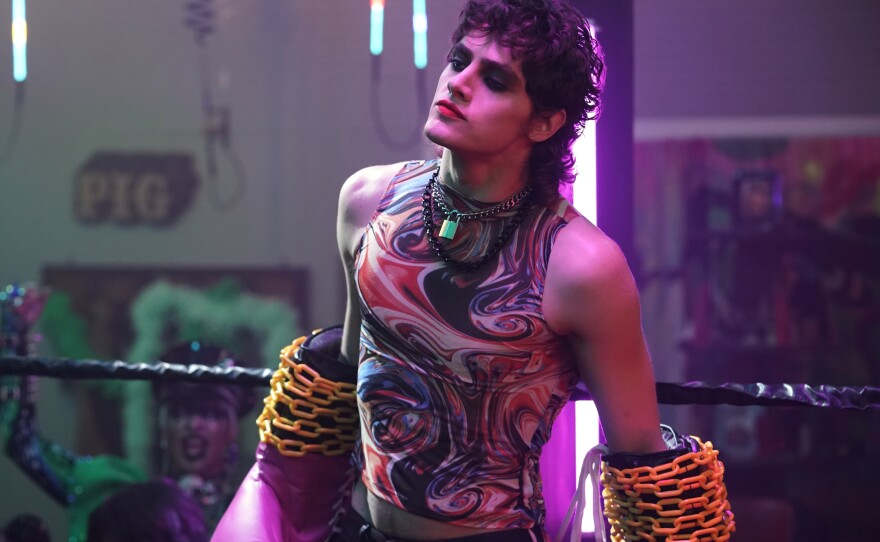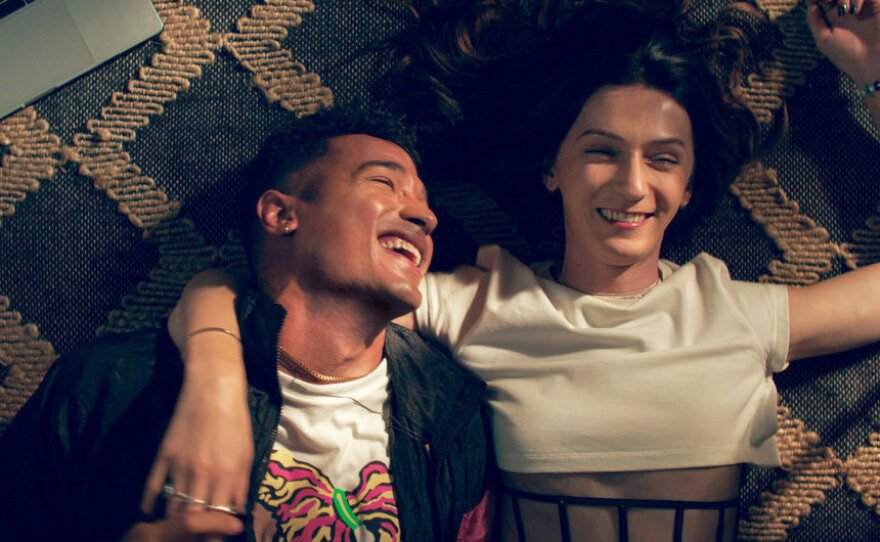If you've been tasked with rebooting Queer as Folk for the present day, and wish to stick to the general narrative parameters shared by both the original U.K. series and the U.S. series that followed (they ran on Channel 4 and Showtime, respectively, back at the turn of the century), here's what you will need to bring to the table.
1. A blithe, defiantly melodramatic sensibility (QaF is a soap, first, last and always) and a cast of ...
2. Queer characters who have explicit sex a tremendous lot, most of whom are ...
3. Noxiously self-involved if not lightly repellent, yet who somehow manage to remain surrounded by a tight circle of mystifyingly supportive friends, all of whom talk in ...
4. Breezy dialogue that tends to lapse into distinctly non-breezy self-righteous speechifying, and/or ...
5. A fusillade of queer pop-culture references that serve as a series of dog-whistles to reassure queer audiences that they're represented in the show's writers room.
Which is to say, both the original U.K. and U.S. series were sexy, sometimes funny, sometimes moving, but deeply flawed projects. And while they are to be commended for storytelling that was always less concerned with chasing mainstream straight acceptance than the Will and Grace-s of the world, both told their stories from a narrow and familiar point of view that centered the travails of the young, white, cis gay man with a gym membership.
The new Queer as Folk has broadened the palette, which means it can tell stories and give voice to characters the old series never could or did.
The new Queer as Folk has broadened the palette, which means it can tell stories and give voice to characters the old series never could or did. Even so, many of the old flaws persist: The characters are selfish and hopelessly enamored of themselves. Dialogue veers from an affronted lecture about intersectionality to a really solid joke about poppers.
What's new, besides the series' matter-of-fact diversity, is how much the show's creators have clearly thought about depicting its range of characters and situations, and giving them real reasons to meaningfully co-exist within the same social circle. The queer community's tendency to build and police strict silos based on race, age, body type, gender, income and disability was not something the old homogenous Queer as Folk series felt they needed to address, and largely didn't.
But the new Queer as Folk eagerly embraces the challenge of creating a diverse network of characters not merely for the sake of doing so, but as a means to let them meaningfully interact and delineate themselves, to variously clash and come together until they emerge as fuller, more rounded people in the eyes of the viewer.

Some relationships are simple enough to diagram. Brodie (Devin Way) is a young hot gay man who returns to New Orleans after dropping out of med school, to the dismay of his adoptive parents, played by Ed Begley Jr. and, because the universe is beneficent, Kim Cattrall. Brodie is best friends with Ruthie (Jesse James Keitel), a trans woman who's married to Shar (CG), a non-binary person who's pregnant with twins. In the pilot, Brodie selfishly urges Ruthie to join him for a night out, which she does, selfishly. (You perhaps begin to detect a theme, here.)
Dialogue veers from an affronted lecture about intersectionality to a really solid joke about poppers.
There's also Noah (Johnny Sibily), Brodie's ex, who's hiding the fact that he's been hooking up with Daddius (Chris Renfro) for reasons that soon become clear. There's Mingus (Fin Argus), one of Ruthie's high school students who's taking their first steps into embracing drag. And there's Julian (Ryan O'Connell), Brodie's sardonically nerdy younger brother who was born with cerebral palsy.
Had the series contented itself with this clutch of characters, it could have churned through soapy plot turns — betrayals, breakups, revelations, etc. — in the desultory way the old QaFs did.
But creator Stephen Dunn introduces a controversial element in the pilot — a mass shooting in a gay club frequented by many of the above characters, not all of whom survive.
Were this event used simply to dramatize the threat faced by the queer community, it might come off as tasteless and a bit ham-fisted, maybe even exploitive. But the series quickly becomes about the reverberations of that traumatic event, and how it causes the various characters to spin out in a number of different ways.
And by involving the violation of a queer public space in the narrative, the series finds a way to neatly incorporate the viewpoints of characters outside of the already-established friend group — club patrons like the drag queen Bussey (Armand Fields) and Marvin (Eric Graise), a guarded, reflexively jaded young man who uses a wheelchair. Both characters play larger roles as the series goes on, much to the benefit of the show as a whole.
QaF '22 feels most new and intriguing whenever it devotes screentime to Graise and O'Connell's characters, because it gives them room to emerge as people who are both living with disability and horny as hell.
Something else starts happening a few episodes in, which didn't happen a lot on the old series. Characters get called on their thoughtlessness. Grudges are held, resentments fester, and ultimately explode. The world around these characters starts to grow more complicated.
At Ruthie and Shar's baby shower, Brodie makes a smug speech skewering his fellow attendees' performative allyship, and Shar cuts him down. The series is saying here that two things can be simultaneously true: Brodie's got a point ... and he's a jerk.
Mingus, traumatized by the club shooting, impulsively donates all of their drag. Later, when they see Bussey sporting some of it at a bar, they drunkenly demand it back, only to be rightly reprimanded for their preening sense of entitlement. Mingus is both going through something real ... and is a privileged, whiny punk.
At one point Ruthie gets a monologue about how the process of transitioning intersected, in complicated ways, with her feelings of sexual attractiveness, and it's a quiet, truthful, revelatory moment that Keitel sells the hell out of. But she's also using the speech to avoid having to come to terms with the night of the shooting. One fact does not undercut the other; both resonate.
Similarly, the series is only too aware of how easily public tragedies can be mined for private gain. The series' most stealthily hilarious performance is provided by Benito Skinner, whose social media influencer gloms onto the club shooting and becomes the self-appointed public face of the tragedy; his character's the source of some of the series' smartest, most ruthless comedy.
It does take all of these nuances, and others, some time to manifest, and along the way the series' tone shifts wildly from scene to scene, sometimes even line to line. It's messy. But ultimately the new Queer as Folk, by telling a wider and more disparate set of stories, manages to produce a narrative that's broader and deeper — and significantly queerer — than its predecessors.
Listen to Pop Culture Happy Hour on Apple Podcasts and Spotify.
Copyright 2022 NPR. To see more, visit https://www.npr.org. 9(MDAzMjM2NDYzMDEyMzc1Njk5NjAxNzY3OQ001))







